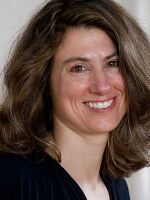As my daughter approached her fourth birthday, I told her that if all went well, she’d have a baby brother or sister in a few months. She asked how the baby could grow inside me, and I told her all about the placenta, uterus, and umbilical cord.
One day she asked me a question I felt unsure how to answer: “How will the baby come out?”
I bunted.
“The doctor takes the baby out,” I replied, feeling both guilty that I dodged her question, yet relieved that at least I didn’t lie. I just didn’t know how much information was appropriate for a 4-year-old, especially one who shared everything with her preschool classmates.
A year later, I came across a program called “Our Whole Lives,” a class about human sexuality for kindergarteners co-taught by a medical doctor. I signed her up immediately.
The kindergarten class covered medically accurate names of body parts, different types of families, and safety issues regarding good versus bad touch. She learned to follow the mantra “No! Run! Tell!” if she encounters inappropriate sexual behavior. The class reconvenes every other year through sixth grade with more focus on puberty and reproduction.
The idea of sex ed for kindergartners may seem radical, but it’s gaining ground. Chicago public schools require five hours of sex ed annually for grades K through four, and more than double that for grades five through 12.
Since starting the program, my daughter has asked my husband and me some uncomfortable questions. But as I’ve read more and more about the benefits of giving kids accurate information about sexual health – and the risks of not doing so – I decided that we can’t afford to avoid the subject.
Three decades of public health research show that sexual education makes young people more likely to delay having sex and use protection when they start than those who get no sex ed or abstinence-only classes which often include misinformation.
Elizabeth Smart, who was kidnapped at age 14 in 2002 and repeatedly raped for almost a year, is a critic of abstinence-only education. Last month during a panel at Johns Hopkins University, she made headlines for saying that her abstinence-only classes deterred her from trying to escape her captors.
Smart said that in those classes, kids were told to think of themselves as sticks of gum. The teacher emphasized that no one wants a used piece of gum. Smart said that after she had been raped, she felt too ashamed to return to society. She said she thought "Nobody re-chews a stick of gum. You throw it away."
Hearing Smart’s story makes me consider the education about human sexuality that we provide our daughter as important as vaccines that help her avoid illnesses, vitamins that help her grow, and glasses that help her see.
So while my husband and I may stumble when answering our daughter’s questions, we know it’s just part of having an open and ongoing conversation about self-respect and boundaries - and not shame.





